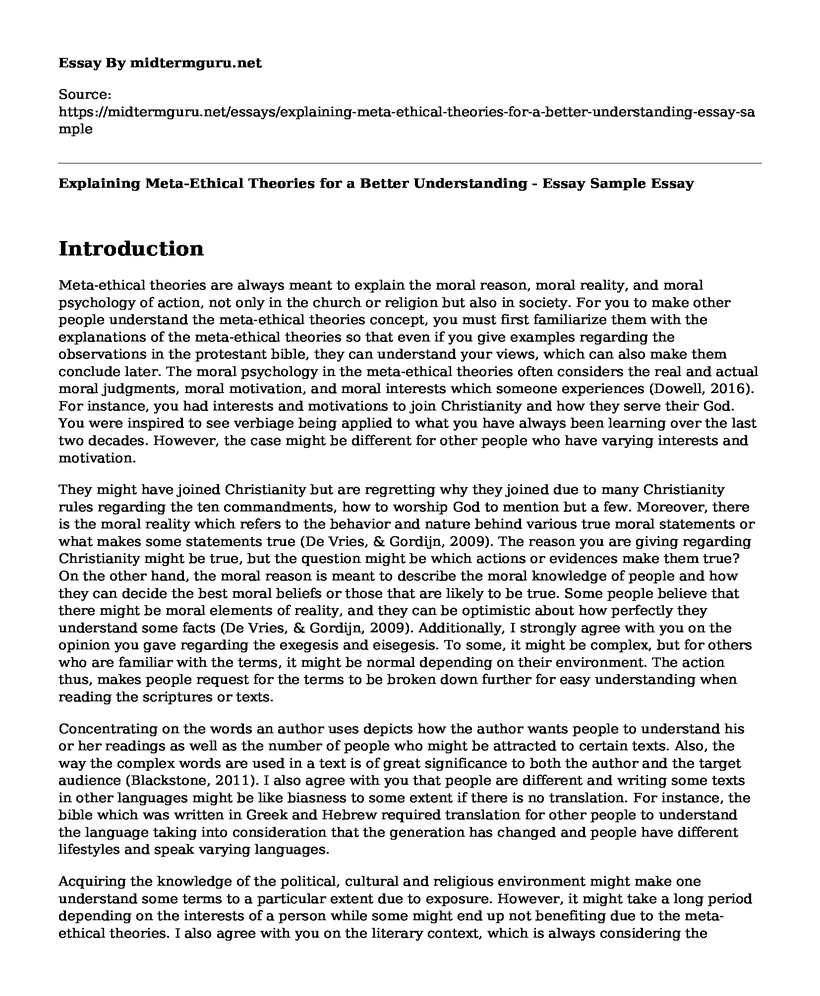Introduction
Meta-ethical theories are always meant to explain the moral reason, moral reality, and moral psychology of action, not only in the church or religion but also in society. For you to make other people understand the meta-ethical theories concept, you must first familiarize them with the explanations of the meta-ethical theories so that even if you give examples regarding the observations in the protestant bible, they can understand your views, which can also make them conclude later. The moral psychology in the meta-ethical theories often considers the real and actual moral judgments, moral motivation, and moral interests which someone experiences (Dowell, 2016). For instance, you had interests and motivations to join Christianity and how they serve their God. You were inspired to see verbiage being applied to what you have always been learning over the last two decades. However, the case might be different for other people who have varying interests and motivation.
They might have joined Christianity but are regretting why they joined due to many Christianity rules regarding the ten commandments, how to worship God to mention but a few. Moreover, there is the moral reality which refers to the behavior and nature behind various true moral statements or what makes some statements true (De Vries, & Gordijn, 2009). The reason you are giving regarding Christianity might be true, but the question might be which actions or evidences make them true? On the other hand, the moral reason is meant to describe the moral knowledge of people and how they can decide the best moral beliefs or those that are likely to be true. Some people believe that there might be moral elements of reality, and they can be optimistic about how perfectly they understand some facts (De Vries, & Gordijn, 2009). Additionally, I strongly agree with you on the opinion you gave regarding the exegesis and eisegesis. To some, it might be complex, but for others who are familiar with the terms, it might be normal depending on their environment. The action thus, makes people request for the terms to be broken down further for easy understanding when reading the scriptures or texts.
Concentrating on the words an author uses depicts how the author wants people to understand his or her readings as well as the number of people who might be attracted to certain texts. Also, the way the complex words are used in a text is of great significance to both the author and the target audience (Blackstone, 2011). I also agree with you that people are different and writing some texts in other languages might be like biasness to some extent if there is no translation. For instance, the bible which was written in Greek and Hebrew required translation for other people to understand the language taking into consideration that the generation has changed and people have different lifestyles and speak varying languages.
Acquiring the knowledge of the political, cultural and religious environment might make one understand some terms to a particular extent due to exposure. However, it might take a long period depending on the interests of a person while some might end up not benefiting due to the meta-ethical theories. I also agree with you on the literary context, which is always considering the generated surrounding material to make people understand some texts. Some people need words or sentences to be translated into lay man's language for them to understand the concept while others can understand them without further explanations. The action makes the context to depend on the level of knowledge and understand one has (Dowell, 2016).
References
Blackstone, W. T. (2011). Are metaethical theories normatively neutral? Australasian Journal of Philosophy, 39(1), 65-74. Doi: 10.1080/00048406112341041
De Vries, R. O. B., & Gordijn, B. (2009). Empirical Ethics and Its Alleged MetaEthical Fallacies. Bioethics, 23(4), 193-201. Doi: 10.1111/j.1467-8519.2009.01710.x
Dowell, J. (2016). The metaethical insignificance of moral twin earth. Oxford Studies in Metaethics, 11, 1-27.
Cite this page
Explaining Meta-Ethical Theories for a Better Understanding - Essay Sample. (2023, Feb 02). Retrieved from https://midtermguru.com/essays/explaining-meta-ethical-theories-for-a-better-understanding-essay-sample
If you are the original author of this essay and no longer wish to have it published on the midtermguru.com website, please click below to request its removal:







